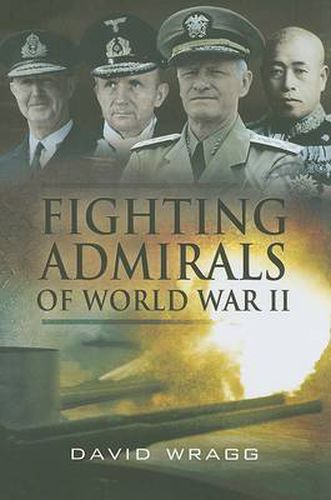Readings Newsletter
Become a Readings Member to make your shopping experience even easier.
Sign in or sign up for free!
You’re not far away from qualifying for FREE standard shipping within Australia
You’ve qualified for FREE standard shipping within Australia
The cart is loading…






Control of the sea was a crucial element in the outcome of World War II. The U-boat campaign almost brought Britain to her knees; the Arctic convoys were vital in keeping Russia in the war; Pearl Harbor brought America into the conflict with massive repercussions; the battle of Midway was one of the key turning points in the war. Allied naval supremacy made the D-day landings possible. Written by a well-know naval historian, this work examines in detail all theaters and major campaigns, focusing on the most important naval commanders of both sides. Included are five British admirals (Pound, Cunningham, Ramsay, Horton, Somerville); five American admirals (King, Nimitz, Spruance, Halsey, Fletcher); three German admirals (Raeder, Doenitz, Lutjens); three Japanese admirals (Yamamato, Nagumo, Koga); and two French admirals (Darlan, de la Borde). The French are included because of the naval problems faced by France, in particular the courageous decision to scuttle their fleet rather than let it fall into German hands in late 1942.
$9.00 standard shipping within Australia
FREE standard shipping within Australia for orders over $100.00
Express & International shipping calculated at checkout
Control of the sea was a crucial element in the outcome of World War II. The U-boat campaign almost brought Britain to her knees; the Arctic convoys were vital in keeping Russia in the war; Pearl Harbor brought America into the conflict with massive repercussions; the battle of Midway was one of the key turning points in the war. Allied naval supremacy made the D-day landings possible. Written by a well-know naval historian, this work examines in detail all theaters and major campaigns, focusing on the most important naval commanders of both sides. Included are five British admirals (Pound, Cunningham, Ramsay, Horton, Somerville); five American admirals (King, Nimitz, Spruance, Halsey, Fletcher); three German admirals (Raeder, Doenitz, Lutjens); three Japanese admirals (Yamamato, Nagumo, Koga); and two French admirals (Darlan, de la Borde). The French are included because of the naval problems faced by France, in particular the courageous decision to scuttle their fleet rather than let it fall into German hands in late 1942.